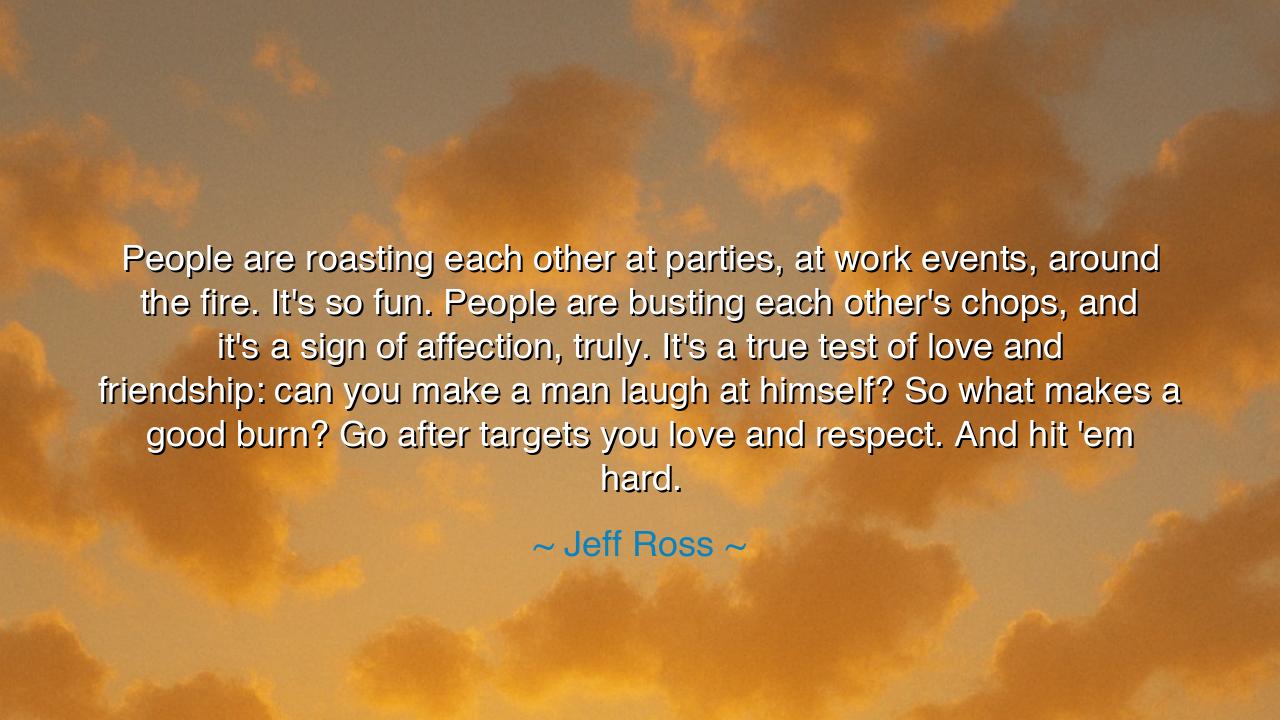
People are roasting each other at parties, at work events, around
People are roasting each other at parties, at work events, around the fire. It's so fun. People are busting each other's chops, and it's a sign of affection, truly. It's a true test of love and friendship: can you make a man laugh at himself? So what makes a good burn? Go after targets you love and respect. And hit 'em hard.






“People are roasting each other at parties, at work events, around the fire. It's so fun. People are busting each other's chops, and it's a sign of affection, truly. It's a true test of love and friendship: can you make a man laugh at himself? So what makes a good burn? Go after targets you love and respect. And hit 'em hard.” — in these vivid, almost playful words, Jeff Ross, known to the world as the Roastmaster General, reveals a profound and ancient truth about the nature of friendship, humility, and affection. Beneath the laughter and the sting of wit lies something timeless: the understanding that love is not always expressed through softness. Sometimes, it comes dressed in mockery — sharp but never cruel — reminding us that to laugh at ourselves is to be free, and to tease those we cherish is to affirm that they are strong enough to take it.
In the world of Jeff Ross, the “roast” is an art form — but in the world of the ancients, it was something even more: a form of communion. The Greeks called it parrhesia, the boldness to speak truth among equals without fear, even if the truth stung. In the laughter that follows, the sting is soothed by affection. When Ross says that roasting is “a sign of affection,” he echoes that old wisdom: only those we love may mock us honestly, for their jest is never meant to wound, but to strengthen the bond. To laugh together, even at one’s own expense, is to declare trust.
This kind of humor — sharp, fearless, but born of love — has always been a mark of deep connection. Think of Socrates and his pupils, who sparred not with swords but with words, teasing each other in debate. Their exchanges were fierce, even mocking, yet beneath them ran a current of profound respect. Or recall Mark Antony and Julius Caesar, who jested openly with one another, knowing that laughter could bridge the divide that power creates. Even kings and philosophers, when bound by friendship, used irony as affection. The ancients understood, as Ross does, that laughter has the power to deflate pride and elevate intimacy.
When Ross asks, “Can you make a man laugh at himself?” he poses a moral question disguised as humor. For the ability to laugh at oneself is a measure of character and humility. Pride resists laughter; fear rejects it. But the wise man, the man at peace with himself, welcomes it — for he knows that mockery loses its power when met with mirth. Thus, the roast becomes not an act of cruelty, but a test of spirit — an affirmation that friendship is built not on fragility, but on trust strong enough to endure honesty.
Yet Ross’s final teaching — “Go after targets you love and respect. And hit ’em hard” — carries the greatest wisdom of all. To mock with love is to honor; to mock without love is to destroy. A good roast, like a good friendship, is built upon respect. The “hit” is powerful only because it is safe; it lands hard but never leaves a scar. When affection anchors humor, even the harshest jest becomes an act of intimacy, for it declares, “I know you — and you know I mean no harm.” This balance of courage and care is what separates true camaraderie from cruelty disguised as comedy.
Consider also the medieval jesters, whose task was to mock the king himself. Only the jester, protected by trust, could speak truth to power through laughter. The wise monarch knew that such jesting was a gift, a mirror held up to the self. Through laughter, he learned humility. So too does Ross remind us that the jest can be a mirror — not of shame, but of humanity. To laugh at one’s flaws is to master them; to be laughed at by one’s friends is to know that one is loved enough to be seen fully.
And so, dear reader, let this lesson sink deep: in a world that takes itself too seriously, learn again the ancient art of laughter born of love. Do not fear the jest, nor hide behind pride. Allow your friends to mock you, for in their laughter lies their affection; mock them in return, but only from a place of warmth. Speak boldly, but kindly. Laugh freely, but never cruelly. For humor is the language of humility, and humility the foundation of friendship.
Thus, Jeff Ross — the comedian cloaked in jest — becomes a philosopher of the heart. His teaching is simple yet profound: that laughter, when wielded with respect, is the truest form of love. So gather with your friends, as the ancients gathered around their fires, and roast one another — not to wound, but to remind each other that perfection is an illusion, and that in the warmth of shared laughter, we are all made equal, all made human, all made whole.






AAdministratorAdministrator
Welcome, honored guests. Please leave a comment, we will respond soon